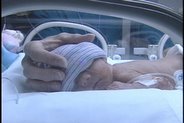 Think of it as a ‘Do it Yourself’ kit for preventing hospital acquired infections (HAI). The kit is a collection of disinfecting wipes, hand rubs and other products designed to prevent patients from catching a bug while they’re in the hospital.
Think of it as a ‘Do it Yourself’ kit for preventing hospital acquired infections (HAI). The kit is a collection of disinfecting wipes, hand rubs and other products designed to prevent patients from catching a bug while they’re in the hospital.The “PatientPak’ is marketed in the
“The PatientPak Hand Sanitiser and Sanitising Wipes are the only products available that are tested and proven to kill and clean away MRSA and at least 99.999% of all bacteria, including dangerous viruses, Norovirus and Bird Flu. Combining a cleaning detergent and bacteria-killing disinfectant in one, harmful bacteria are killed in just 10 seconds. PatientPak’s Hand Sanitiser and Sanitising Wipes, the most extensively tested products on the market, are also the only MRSA-killing products that are hand safe with just 5% alcohol, meaning that food can be eaten after application with no need to re-wash hands.”
Maybe I’m reading this wrong, but the first sentence indicates that viruses are a subset of bacteria (see bold text). A quick scan of the web site reveals no corroborating case studies or published data on germicidal efficacy. If the products are indeed the most, “…extensively tested…” shouldn’t the test results be available?
I’d like to know how the sellers know that the products ‘kill’ bird flu? Was it tested against H5N1, or was it a surrogate? Or does it work against Influenza A, and therefore it is assumed to likely be effective against bird flu?
I’m also sceptical of the germicidal effects of a detergent that is used for 10 seconds. To the best of my knowledge, detergents do not ‘kill’ or deactivate microorganisms. Detergents help water remove and dilute contaminants. It is generally accepted that washing your hands with a detergent (soap) requires a good 20 seconds or so. I may be wrong, but since the company does not provide an explanation of their technology or other scientific studies, we are forced to use the information that we have.
On the positive side, I like the idea of empowering people to actively participate in their healthcare. Bringing the PatientPak to the hospital is not necessarily a sign that a hospital is not doing its job. To me it is an indication that HAIs are environmental issues requiring a broad-based strategy. While hospitals need to do more, I wouldn’t bet my life on it.
So, would I buy the PatientPak? No, not based upon what I know of the kit so far. I do not believe, however, that it will cause any harm. It might actually help. There’s a lot of sizzle in this product promotion, but not much science. It is always wise to remember that there are no panaceas for HAI.

